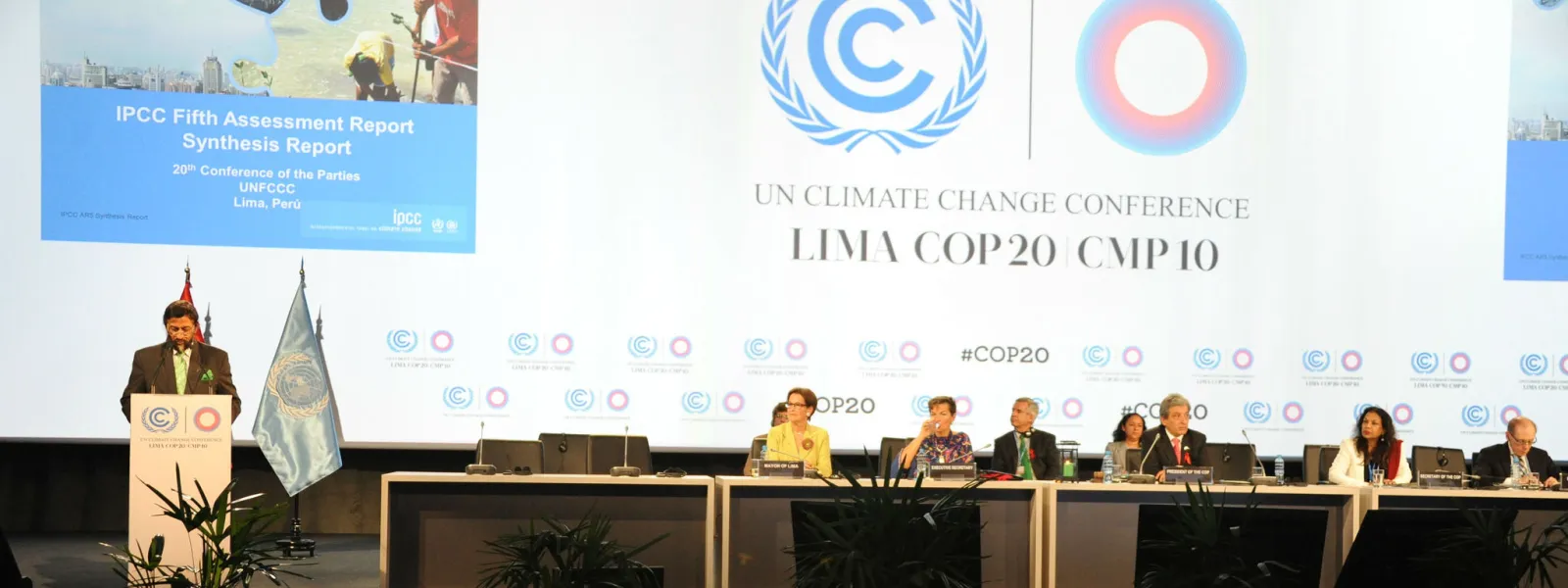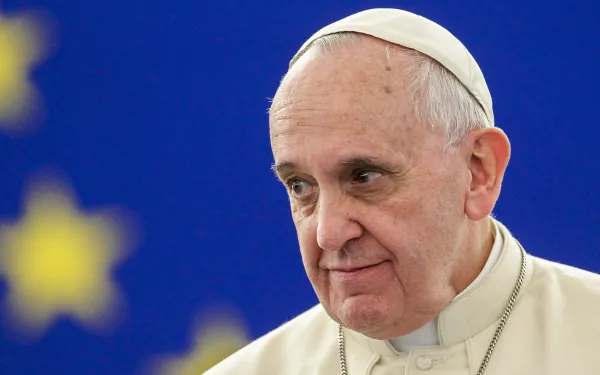
Project
Photo: UNFCCCMonitoring the UN Climate Negotiations
As changes in climate become more extreme, their affects are being hardest felt throughout developing countries. Since 1994, the United Nations Framework Convention on Climate Change has laid out actions to limit the increase of global average temperatures and confront the impacts of climate change.
The States that are Parties to the Convention meet every year in the so-called Conference of the Parties (COP) to review their commitments, the progress made in fulfilling them, and pending challenges in the global fight against the climate crisis.
At COP21 in 2015, they adopted the Paris Agreement, which seeks to strengthen the global response to the climate emergency, establishing a common framework for all countries to work on the basis of their capacities and through the presentation of Nationally Determined Contributions (NDC) that will:
- Limit the increase in global temperatures to 2°C compared to pre-industrial levels and continue efforts to limit it to 1.5°C;
- Increase the capacity of countries to adapt to the impacts of climate change; and
- Ensure that financing responds to the goal of reducing greenhouse gas emissions.
Our focus areas
THE CLIMATE CRISIS AND HUMAN RIGHTS
The climate crisis, due to its transversal character, has repercussions in various fields, geographies, contexts and people. In this regard, the Preamble to the Paris Agreement states that it is the obligation of States to "respect, promote and fulfill their respective obligations on human rights, the right to health, the rights of indigenous peoples, local communities, migrants, children, persons with disabilities and people in vulnerable situations and the right to development, as well as gender equality, the empowerment of women and intergenerational equity."
AIDA at the COP
COP25: Chile-Madrid 2019
At COP25 in Madrid, Spain, we advocated for the inclusion of the human rights perspective in various agenda items. We promoted the incorporation of broad socio-environmental safeguards in the regulation of Article 6 of the Paris Agreement, which refers to carbon markets. We closely followed the adoption of the Gender Action Plan, as well as the Santiago Network, created "to catalyze technical assistance […] in developing countries that are particularly vulnerable to the adverse affects of climate change." We also encouraged the inclusion of ambitious and measurable targets for the reduction of short-lived climate pollutants in the climate commitments of States.
Related projects

Strengthening the Sea Turtle Treaty
By Gladys Martínez When baby sea turtles first break through their shells, they slowly stick their heads out into the world. Then, they run as fast as they can to the vast body of salt water before them, where they will spend their lives. Sea turtles are migratory creatures that swim in the oceans, and nest on the beaches, of many different countries. Their survival is at risk from the impacts of human activity, such as unsustainable fishing, poorly planned development, and mining projects in marine and coastal areas. In an effort to confront these threats, the Inter-American Convention for the Protection and Conservation of Sea Turtles was created in 2001. The international treaty promotes the protection, conservation and recovery of sea turtle populations. From June 24 to 26 in Mexico City, representatives from member States will discuss achievements and plan for the future of the Convention during the 7th Conference of Parties. AIDA will be there advocating for the States to continue meeting their obligations and making new commitments. Fifteen Contracting Parties have signed the Convention: Argentina, Belize, Brazil, Chile, Costa Rica, Ecuador, Honduras, Mexico, Nicaragua, Netherlands (Antilles), Panama, Peru, Uruguay, Venezuela and the United States. Thirty-two accredited observers, including academic institutions and NGOs, may participate in meetings of Scientific and Consultative committees of experts. The 7th Conference of the Parties will focus on adopting three key resolutions, on: The conservation of leatherback sea turtles (Dermochelys Coriacea) in the Pacific Ocean. The conservation of loggerhead sea turtles (Caretta Caretta). Exceptions to the subsistence harvest of olive ridley turtle eggs in Costa Rica. The Conference will also review the States’ compliance with regards to their annual reports, present the Secretariat’s work plan, and elect a new President, Vice President and Rapporteur. AIDA will seek for the States to: Commit to avoiding threats to turtle nesting habitats by mining projects. Continue restricting and prohibiting developments that affect sea turtle migration routes. Strengthen measures for responsible fishing and bycatch (sea turtles are captured and killed incidentally by fishermen targeting other species). We will concentrate our outreach efforts on creating awareness and promoting measures to curb the risks that the Don Diego marine mining project will have on the loggerhead turtle and Mexico’s marine ecosystem. AIDA has worked since 1998 to protect sea turtles. First we advocated the Convention’s ratification. A campaign organized by AIDA and other sea turtle advocates helped secure the signatures necessary to continue the negotiation process, and, in 2011, for the Convention to enter into force. We have advocated before Courts and decision-makers for the protection of sea turtles in several countries of Latin America, basing our advocacy on the obligations assumed by States under the Convention. Using this strategy, we have protected the green turtle from illegal poaching on Costa Rica’s Atlantic coast, avoided loss of nesting habitat of the leatherback turtle, and guaranteed that hawksbill and olive ridley turtles continue to enjoy one of their favorite coral reefs, Coiba National Park in Panama. Follow us on Facebook and Twitter to learn more about the 7th Conference of Parties of the international treaty to protect sea turtles!
Read more
AIDA applauds Pope Francis’ recognition of urgent environmental challenges
The Interamerican Association for Environmental Defense (AIDA) applauds Pope Francis’ new Encyclical, Laudato Si: On Care For Our Common Home, released today. In it, the Pope addresses the environmental challenges facing humanity, which must be urgently addressed in order to protect the earth “with which we share existence.” His Holiness highlights the recommendations of organizations, like AIDA, which we hope will finally be echoed in governments, international organizations, corporations, and by all the people of this planet. We all have a responsibility to act to protect our home. The encyclical is comprehensive and covers many important issues. We would like to emphasize the Pope’s recognition of the following: The work performed by organizations and individuals to protect the environment. We are grateful for his gesture, and feel honored and committed to continuing this hard work. That fact that “recent World Summits on the environment have not lived up to expectations because, due to lack of political will, they were unable to reach truly meaningful and effective global agreements on the environment.” He concludes, “Reducing greenhouse gases requires honesty, courage and responsibility, above all on the part of those countries which are more powerful and pollute the most.” Social inequality and the impact of environmental degradation, which worsens the misery of the poor, including migrants and indigenous communities. We therefore reiterate our call to protect Earth, taking into particular consideration solutions that address this inequality. The rich and complex biodiversity of the planet’s ecosystems, which must be preserved, as well as the human right to water, which “is essential to human survival and, as such, is a condition for the exercise of other human rights.” The Precautionary Principle as a tool to avoid serious and irreversible harm to the environment. With this Encyclical, Pope Francis joins other religious leaders who have made an urgent call for the adoption of immediate measures to protect the planet.
Read moreClosing Statement by NGOs at Ramsar COP12
Presented by Rafaela Nicola, World Wetland Network Committee’s Neo-Tropics delegate We would like to thank the Secretary General and the Parties for this opportunity to address the meeting, to share our message that NGOS are committed to Ramsar and we want to do more. We also wish to thank the government of Uruguay for hosting the COP. We appreciated the field trips yesterday, which introduced us to the beautiful wetlands in this country, some of which are Ramsar Sites. World Wetland Network was launched at Ramsar COP 10; this is our third COP. Our participation in Ramsar is recognized in Resolution 11.6.We were formed to complement the activity of the IOPs. We fully appreciate the value and expertise of the non-governmental IOPs, who work in strong partnership with local communities and indigenous peoples. WWN was formed at the initiative of smaller, grass-roots NGOs and CSOs seeking a voice at the table. I speak on behalf of our 2000 members worldwide and our friends at the COP: local and sub-regional organizations who have been meeting daily to engage with and monitor this important process. The core work of the Ramsar COP 12 has been the resolutions. Crafting and revising resolutions. Collaborating, negotiating and finally reaching agreement. We humbly acknowledge the co- operation and hard work of the Secretariat, Contracting Parties and IOPs to create meaningful resolutions that ensure conservation and wise of our world’s wetlands. When we all return home the real challenge begins, turning these resolutions into action. We urge the Contracting Parties to show steadfast commitment and leadership. We stand ready to help at the local level. The Fourth Strategic Plan is the most significant outcome of this COP, guiding our combined efforts for the next nine years. World Wetland Network welcomes the Contracting Parties initiative to strengthen engagement of NGOs, civil society groups, local communities and indigenous peoples in the Strategic Plan. These stakeholders provide a long-term and often continuous connection to wetland sites and are essential partners to achieve the Ramsar vision. We note that the top priority of the Strategic Plan is to prevent, stop and reverse the loss and degradation of wetlands. Your recognition of the key threats including unsustainable agriculture, forestry and extractive industries, especially oil, gas, mining, and urbanization closely reflects the local knowledge and concerns of our members, in Latin America and globally. We encourage Contracting Parties to work cohesively across ministries and prioritize long-term sustainability when approving developments. A healthy environment is fundamental to our economic and social security. Cohesive implementation will be supported by the effective mobilization of National Wetland Committees. We note that establishment of these committees, with both government and non- government representatives, is an indicator for success of Goal 1 in the Plan, and we urge the parties to comply. The theme of the COP has been “Wetlands for our future.” That future starts today. Every planning and development decision taken today will directly impact on wetlands and the communities that depend on them. Our message is loud and clear: we are committed to Ramsar and we want to do more. We trust our activities at Ramsar COP 12 have enhanced the meeting and we pledge our commitment to the conservation and wise use of wetlands. Thank you
Read more